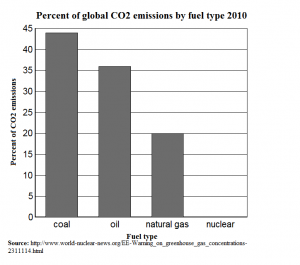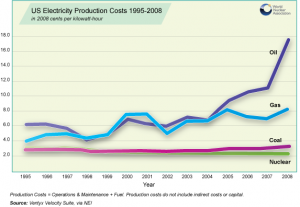Nuclear power has been a dormant issue since its expansion stopped in the 1970s. But with the Nuclear Regulatory Committee’s recent decision to allow the construction of two new nuclear power plants the question of nuclear power has returned to the spotlight. Is this comeback of nuclear power a good thing, or should we be concerned?

Many groups, including several environmental groups, oppose the use and expansion of nuclear power plants. They argue that nuclear power is inherently dangerous and that it is not cost effective compared to alternatives. These concerns are valid; most people have heard of Three Mile Island and Chernobyl, and Fukushima is still fresh in people’s minds. On top of this is the fear of terrorism and the possibility of a “meltdown.”
In addition to the dangers of living near a nuclear power plant, there is the high cost of the plants themselves. Nuclear power plants are by far the most expensive type of plant. New plants in Georgia are estimated to cost 14 billion dollars each.1
Several groups argue that with these high costs the government should support alternates such as natural gas, wind and solar, which cost substantially less. A final concern is the highly radioactive waste generated by these power plants, some of which can last for hundreds of years.
While nuclear power plants have the potential for deadly accidents, these chances are overstated. Nuclear power plants were first introduced in the 50s, and since then there have been only three major accidents. Given that there are hundreds of nuclear power plants currently operating, three accidents over a sixty-year period is actually a pretty good safety record, especially compared to other types of power, like coal.

Furthermore, living two months in a typical stone or brick building (with natural radiation), living two months in Denver (cosmic radiation) or spending three hours in a coal mine all include the same risk of death that would come with living in relatively close proximity to a nuclear power plant.2 Nuclear power is, actually, fairly low risk.
Even furthermore, nuclear power is very green, as it releases no CO2 and the only pollution it generates is nuclear waste, which is not that dangerous. Only a very small portion of waste is highly radioactive and this often can be reprocessed into fuel. The small amount of waste that cannot be recycled is fairly easy to store until it is safe to discard.3
The reason nuclear power plants are so expensive is because they have high construction costs. Nuclear power is one of the most complex and potentially dangerous forms of power available, so a lot of money is spent making the plants safe. These high up-front costs are offset by very low fuel costs, which is the opposite of most power sources. This means that nuclear power plants, once built, can produce cheap energy, offsetting their high construction costs. Furthermore, nuclear fuel is much more efficient than other fuels, meaning uranium produces several times the amount of energy as does the same amount of, say, coal.3 Thus the price of nuclear fuel tends to fluxuate much less than coal, natural gas or oil, and, unlike wind or solar power, it is not reliant on weather conditions. A recent analysis from Japan highlights the cost advantage of nuclear power, concluding that the cost per kilowatt-hour for nuclear energy is nine cents, compared to thirteen for oil, and twelve for renewable energy sources.4
President Obama believes that nuclear power is a necessary part of America’s clean energy future and supports the new plant construction in Georgia.5 Looking at the cost advantage, safety and greenness of nuclear power, I find myself agreeing with him. We should approve of nuclear power as a way to brighten America’s future, as it means lower energy costs and less pollution.
1) Steven Mufson. The Washington Post. 2/9/2012.
2) Richard Wilson. Technology Review 81, No. 4 (1979).
3) www.world-nuclear.org
4) www.world-nuclear-news.org
5) Matthew L. Wald. The New York Times. 2/16/2010.
Post very nicely written, and it contains useful facts. I am happy to find your distinguished way of writing the post. Now you make it easy for me to understand and implement. Thanks for sharing with us
Free energy is not free. Solar, for nctsanie, requires solar cells or more complicated machinery. There is a capital investment involved, even if fuel costs are very low. When nuclear first came out, some people thought it would be too cheap to meter . Generally, solar *still* costs more than nuclear or coal. If you wish to promote alternatives, it might help to provide a link.
I agree that nuclear power is, for the most part, safe. I still have concerns about the stored waste. It’s a real shame that the cost to build a nuclear plant is so astronomical and a large portion of this cost is to keep us safe. I understand that nuclear is here to stay but we still need alternates such as natural gas, wind and solar. Wind and solar are 2 forms of energy that even middle income families can take advantage of. The high cost of solar panels and wind generators can be greatly reduced when you build them yourself. For more info on homemade wind and solar power, please visit homepowerfree.com
We are following the step by step natural link building method for our clients to help their website search engine ranking on the largest search engine Google.
I believe that wind or solar power is a much safer method of alternative energy. Nuclear power plants in operation today are still cheaper than subsidizing wind or solar farms. I be-leave these Nuclear plants put us in to vulnerable a position for accidents from a glitch in the tech end of things, to sabotage. If somethings serious happens with a cooler for nuclear rods, no matter the fail-safe systems the loss in life even if it is “one” the cost is to much it;s not like change a broken propeller or fixing a short in the wiring or changing a diode or fixing a solar panel any way I think it’s time for a change for safety that’s a true opinion. Even thou I do have a site called
windmillandsolarpower.com G.W.